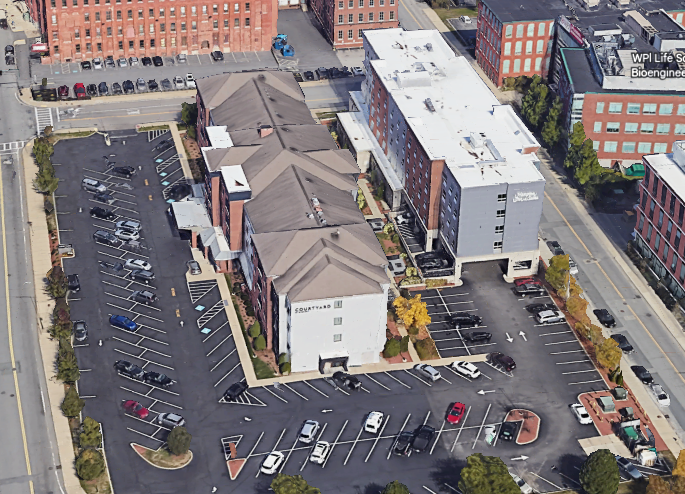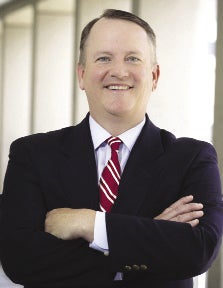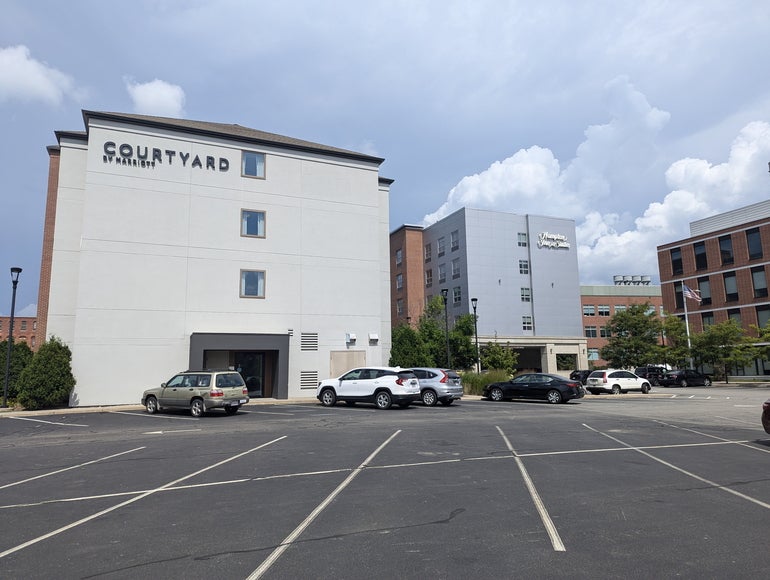Worcester Polytechnic Institute on Monday re-asserted its plans to buy two Worcester hotels from a New York asset management firm and convert them into student housing, despite an increasingly loud pressure campaign against the move, which is now headed to Worcester City Council.
In a letter addressed to the WPI community and shared with WBJ on Monday, the university said the decision to convert the Gateway Park hotels into housing is the result of a multi-year effort to address student housing shortages, a situation the university says has been made worse by the city’s tight housing market.
Both hotels will continue to operate at their current capacity until 2026, at which point the 100-room Hampton Inn will be converted to student housing; WPI expects the 134-room Courtyard Marriott to operate as a hotel through at least 2030, according to the letter signed by WPI Executive Vice President and Chief Financial Officer Michael Horan and Senior Vice President for Student Affairs Philip Clay.
“Many of you live in the city and therefore know that the Worcester housing market is extremely tight, with ever-increasing apartment rents and a vacancy rate of 1.7%, one of the lowest in the country,” the letter reads. “This situation puts considerable strain on our students’ ability to find affordable housing and adds pressure to the city’s housing crunch. Our plans to increase our on-campus housing will not only help our students, it will also create space in the market for families and other renters impacted by the housing shortage.”
Monday’s letter comes after the city’s Economic Development Coordinating Council, a behind-the-scenes organization made up of government and business officials, wrote a letter to WPI and began a public effort in opposition to WPI’s plans.
The EDCC’s primary concerns were the loss of excise tax revenue from the hotels and the property tax from the land, as WPI is a nonprofit not required to pay property taxes. EDCC estimated the City of Worcester would lose about $1.6 million in annual revenues. Additionally, EDCC is concerned about the jobs at the hotels and the impact on the tourism industry of losing the two hotels.
WPI said in its letter both hotels will pay property and hotel taxes for as long as they operate as hotels. The university does not foresee any loss of jobs for those employed at the hotels, and the current management company will be retained. The letter outlined the university’s 159-year relationship with the City of Worcester, referencing the $9 million it has been paid to Worcester in lieu of taxes as part of a 2009 agreement and saying WPI has always been a solid community member and good neighbor.
“We are proud that this academic year our students are coming from 47 states and nearly 100 countries, carrying the name of our home city and this university around the world,” the letter reads. “Almost 450 WPI employees reside in Worcester, helping to make the university and the city a better place. And as of 2023, WPI technologies and resulting local and regional spin-out companies have employed more than 400 people and raised approximately $1 billion in investment.”
WPI’s community impact report says the university has paid $14 million to Worcester businesses as suppliers and vendors to the university, and the university has contributed $5.6 million in grants and scholarships for Worcester residents.
“Beyond these contributions, we have provided support, training, and tutoring in Worcester schools, partnered with the city on public safety initiatives, and enriched our community in countless ways,” the letter reads.

Pressure campaign heats up
A number of orders related to WPI’s plan have been filed by Worcester City Council members ahead of the body’s Tuesday meeting, as detractors of the hotel conversion have continued to apply public pressure encouraging the university to ax the proposal.
Worcester Mayor Joseph Petty is requesting City Manager Eric Batista compile a report detailing how WPI’s plan will impact the city. Petty is requesting the report to include details on the history of the Gateway Park project and any agreements the city has made with the two impacted hotels.

Councilor Moe Bergman is asking for a report on any agreements between the City and WPI regarding Gateway Park, as well as details on the university’s payment in lieu of taxes agreement with the city and any legal recourse the city may have.
Councilor Candy Mero-Carlson is requesting a report on the ramifications of the purchase on the city’s travel and tourism efforts and if there’s any conditions to allow the City to tax a property owned by a university.
Councilor Etel Haxhiaj is asking for a report detailing property purchased by the city’s universities and colleges since 2019, asking for details on whether these properties were kept on the tax roll and details on any community benefit agreements signed as a result of these purchases.
Since the informal EDCC was the organization that took up the anti-WPI cause initially, Haxhiaj took to social media on Tuesday to argue EDCC does not represent the racial or economic diversity of the city.
Since the EDCC’s letter to WPI was made public on Aug. 19, the public controversy has led to more public attention toward the City’s relationship with the school and Worcester’s existing tourism industry.
Current hotel stock
The two hotels involved in WPI’s plan, the Hampton Inn & Suites at 65 Prescott St. and the Courtyard by Marriott at 72 Grove St., were both purchased in October 2017 by Breit Mass Property Owner LLC, a Chicago-based entity operated by Blackstone, a prominent asset management firm based in New York City, for a combined $29.76 million, according to City of Worcester property records.
Blackstone told the Telegram & Gazette in 2019 it acquired the properties with a long-term view. Neither of the hotels have been sold as of Monday, according to Worcester District Registry of Deeds records.
WPI has requested $26 million in state bonds to help fund the conversion project, according to an Aug. 8 agenda for a Massachusetts Development Finance Agency meeting.
It’s not unprecedented for a hotel property in the city to be purchased by higher education institutions seeking more housing for students. In 2010, the struggling Crowne Plaza Hotel, formerly located at 10 Lincoln Square, was sold for $16.8 million to the Massachusetts College of Pharmacy and Health Sciences. The site is now the home of the school’s Lincoln Square Academic and Student Center.
The 243-room Crowne Plaza Hotel closed following financial difficulties exacerbated by the 2008 recession, an event that led to a steep decline in the need for hotel rooms in Worcester and beyond.
Worcester has seen hotels constructed in the years since the recession, but the aftermath of the COVID-19 pandemic in 2020 led to another decline in demand and hotel occupancy in the city, albeit a less-pronounced decline than other areas of the country. Area hotels were beginning to see a rebound in demand in 2023.
Overall, Worcester has 1,019 hotel rooms, although Hotel Worcester, a 96-room hotel at 110 Summer St. that has operated under a number of names and affiliations over the years, is currently closed to guests as the site is being utilized as a shelter by the state.
The temporary closure of Hotel Worcester leaves the city with 923 rooms. An additional four hotels, totaling 370 rooms, are located in Auburn. These hotels are about a 12- to 15-minute drive from the DCU Center, a common site for conventions and other events attracting visitors to the area.
Larger conventions at the DCU Center can incur demand of upward of 1,000 hotel rooms, DCU Center General Manager Sandy Dunn said in 2019.
Another 375 Worcester proposed hotel rooms are in various stages in the development pipeline, with the proposed construction of a 100-room hotel in a vacant parcel at Washington Square and a 125-room hotel proposed for a parcel across the street from the Polar Park baseball stadium. Both projects have faced delays and have yet to begin construction. The owner of the Mercantile Center in Worcester has proposed a 150-room hotel downtown.
Closure impact
Timothy Murray, president and CEO of the Worcester Regional Chamber of Commerce, highlighted the project’s potential negative impact on the region’s tourism industry in a letter penned by himself and others involved in the leadership of the EDCC, an informal partnership of the leaders from the City of Worcester, the chamber, the Worcester Business Development Corp., and the incubator Massachusetts Biomedical Initiatives.

The letter criticizes the potential impact of WPI’s plans to purchase the hotels, saying the move would decrease the city’s hotel room capacity by 25%, remove $758,000 from the City of Worcester’s property tax rolls and $850,6060 from its annual hotel/motel tax revenue. The City of Worcester’s annual budget is $893 million.
In the days since, figures involved in the city’s tourism and events scene continued to apply pressure to WPI to cancel the project. Discover Central Massachusetts President Monique Joseph wrote a letter to the university highlighting the potential negative impact of the plan on the city’s ability to attract large events, according to the Worcester Guardian.
Both Joseph and the DCU Center’s Dunn expressed their concerns to the Worcester Guardian in the article, which included a headline claiming the move would paralyze tourism and events in the city. The Guardian was founded by the Worcester Regional Chamber of Commerce as a nonprofit digital news organization in September 2023. The outlet considers itself an independent operation from the chamber, although Murray maintains a seat on its board.
On Saturday, Robert Vigeant, a part-time bartender at the Courtyard Worcester hotel, wrote an opinion piece for the Telegram & Gazette offering a personal take on the impact of the potential closure of the hotel, further adding to the public campaign against the school’s proposal.
WPI’s need for housing
With 7,308 total degree-seeking undergraduate and graduate students, WPI has more than 2,400 students living in school-owned or -affiliated housing, according to its website.
The school’s attempt to build more student housing at the two hotel sites could lead to more availability of apartments and housing to help fight the area’s housing crunch, although the exact scale of WPI’s proposed student housing hasn’t been publicly revealed.
In 2009, WPI agreed to pay $9 million in voluntary payments to the City over 25 years in lieu of taxes, which the nonprofit educational institution is not required to pay. In April 2015, the agreement was amended to increase the voluntary payment by an additional $130,000 annually, also increasing 2.5% annually, according to consolidated financial statements released by WPI in 2023.
WPI will have paid the City a total of approximately $18 million in PILOT payments through the year 2034, according to the letter on Monday.
Eric Casey is a staff writer at Worcester Business Journal, who primarily covers the manufacturing and real estate industries.

